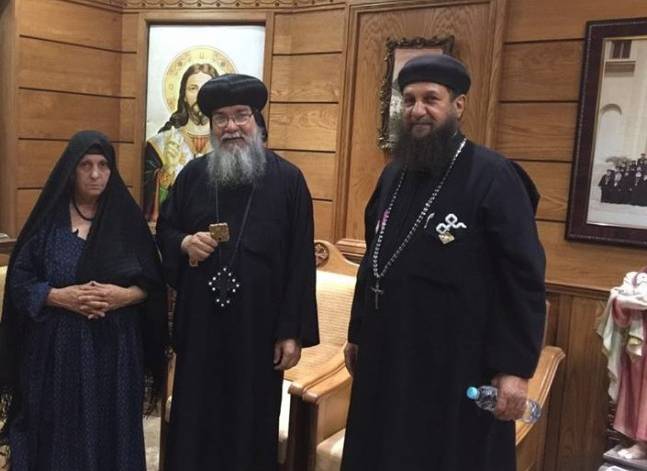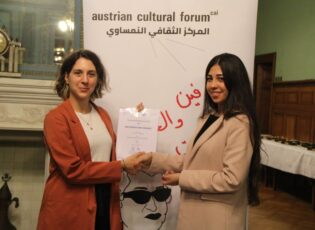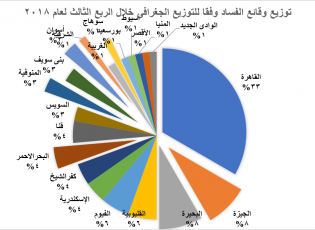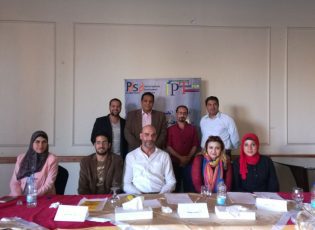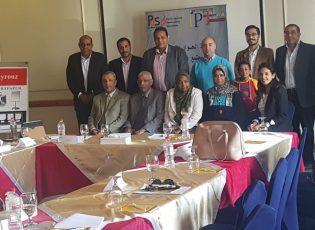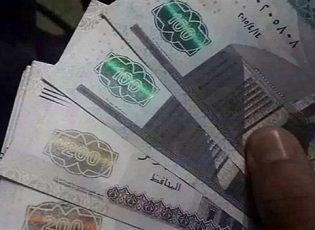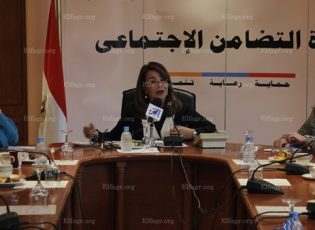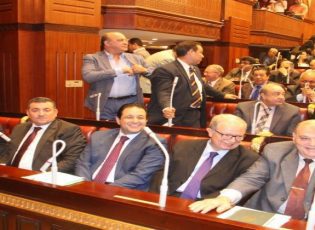The fact that an elderly Christian woman was stripped of her clothes in Minya, in a sectarian incident, sparked a state of discontent among human rights activists and the pioneers of the social networking site "Facebook". Some called for the dismissal of the governor, Major General Tariq Nasr, after his statements that reduced the size of the incident, as he commented As "a simple need."
In this context, Dalia Ziadeh, Director of the Egyptian Center for Democratic Studies, said: It is not possible to remain silent on what happened to the elderly woman who was subjected to torture, abuse and nakedness in Minya, especially since the crime took place with premeditation and stalking, and was carried out on a sectarian basis, and preceded by an explicit threat to burn homes and displace their owners. And assaulted them.
Ziada added that the role of the state is greater than the woman's condolences for what happened to her, but it must come to her right, first by arresting everyone who participated in her torture in this way, and secondly by trying them and inflicting the maximum punishment on them, so that they are an example to others.
The director of the Egyptian Democratic Center called on the state to carry out the punishment publicly and to rule the matter with the utmost decisiveness, because secrecy would turn Upper Egypt into an "ISIS forest" and threaten to repeat similar crimes against Copts there, as she put it.
For his part, Hafez Abu Saada, Director of the Egyptian Organization for Human Rights, said that the right to the inviolability of the body is the right of every human being and that stripping an elderly woman of her clothes in this way is unacceptable under international charters and conventions on human rights, as well as the Egyptian constitution that protects life The body is accorded a sanctity that cannot be violated, stressing that such violations must be addressed.
Abu Saada added that the national fabric is complete with the people of the nation as a whole, regardless of religion, and the role of Al-Azhar, the Church, the media and civil society must be activated to eliminate such negative practices that affect the cohesion and unity of society.
He emphasized that attacking the elderly lady in this way is inconsistent with the principles and rules of human rights approved by international charters and conventions, but rather with customary rules, moral principles and all divine religions.
Abu Saada demanded an investigation into the attack on property and homes and their burning, as well as the assault on the elderly lady in this way and the perpetrator of this matter to be brought to court to take deterrent penalties against him, to eliminate such morals that play on the pace of religion and affect the Egyptian citizen, as well as to confirm the state Rule of law.
For his part, Walaa Jad al-Karim, Director General of the Partners for Transparency Foundation, said that the state has problems in accepting and dealing with others. He went on to state that “the state treats Copts as second-class citizens.”
Gad al-Karim added that the societal discourse is bad and negative and leads to recurrence of such incidents, noting that the elite is content to theorize in front of the cameras, while it does not have an effective enlightening role on the ground.
“Jad Al-Karim” commented on the governor’s statement that “he does not have a political vision, and the general situation had to be calmed down, but he added to the fire of the crisis,” stressing that the state must urgently pass laws for places of worship and sectarian violence in order to avoid such crises in the future. Portal News
In this context, Dalia Ziadeh, Director of the Egyptian Center for Democratic Studies, said: It is not possible to remain silent on what happened to the elderly woman who was subjected to torture, abuse and nakedness in Minya, especially since the crime took place with premeditation and stalking, and was carried out on a sectarian basis, and preceded by an explicit threat to burn homes and displace their owners. And assaulted them.
Ziada added that the role of the state is greater than the woman's condolences for what happened to her, but it must come to her right, first by arresting everyone who participated in her torture in this way, and secondly by trying them and inflicting the maximum punishment on them, so that they are an example to others.
The director of the Egyptian Democratic Center called on the state to carry out the punishment publicly and to rule the matter with the utmost decisiveness, because secrecy would turn Upper Egypt into an "ISIS forest" and threaten to repeat similar crimes against Copts there, as she put it.
For his part, Hafez Abu Saada, Director of the Egyptian Organization for Human Rights, said that the right to the inviolability of the body is the right of every human being and that stripping an elderly woman of her clothes in this way is unacceptable under international charters and conventions on human rights, as well as the Egyptian constitution that protects life The body is accorded a sanctity that cannot be violated, stressing that such violations must be addressed.
Abu Saada added that the national fabric is complete with the people of the nation as a whole, regardless of religion, and the role of Al-Azhar, the Church, the media and civil society must be activated to eliminate such negative practices that affect the cohesion and unity of society.
He emphasized that attacking the elderly lady in this way is inconsistent with the principles and rules of human rights approved by international charters and conventions, but rather with customary rules, moral principles and all divine religions.
Abu Saada demanded an investigation into the attack on property and homes and their burning, as well as the assault on the elderly lady in this way and the perpetrator of this matter to be brought to court to take deterrent penalties against him, to eliminate such morals that play on the pace of religion and affect the Egyptian citizen, as well as to confirm the state Rule of law.
For his part, Walaa Jad al-Karim, Director General of the Partners for Transparency Foundation, said that the state has problems in accepting and dealing with others. He went on to state that “the state treats Copts as second-class citizens.”
Gad al-Karim added that the societal discourse is bad and negative and leads to recurrence of such incidents, noting that the elite is content to theorize in front of the cameras, while it does not have an effective enlightening role on the ground.
“Jad Al-Karim” commented on the governor’s statement that “he does not have a political vision, and the general situation had to be calmed down, but he added to the fire of the crisis,” stressing that the state must urgently pass laws for places of worship and sectarian violence in order to avoid such crises in the future. Portal News
Short link: https://pfort.org/en/?p=1275

